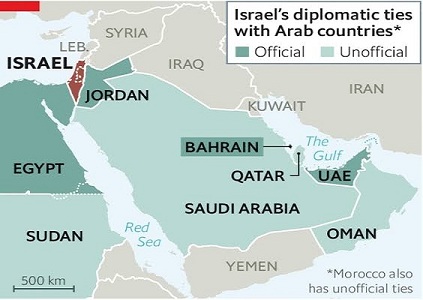After the signing of the Abraham Accords, the Gulf States are gradually espousing Israel and especially the Hebrew language. Bahrain and the United Arab Emirates have signed deals of rapprochement with Israel as a result of the deal brokered by US led by Trump. On the streets of Dubai, Shalom can be commonly heard these days. Demand for the lessons of Hebrew language is picking up in the Gulf States.
With ties opening up with Israel, the demand of relevant communication skills is growing among the young people in Gulf States. Also, apart from this, the people in the Gulf States especially in the cities like Dubai, who have connections and friends across the world are keen to learn something which is not native of the region. Apart from the diplomatic steps and efforts taken by US, Israel and the Gulf States, there were developments within the Emirates which provided the ground for the integration of Israeli culture. For example, Emirates had officially declared the year of 2019 as the Year of Tolerance, which led some of the Jewish expats to come out in the open with plans to build a synagogue.
Also Read: Israel UAE sign deal to begin diplomatic ties- what does it mean for Palestine
As a consequence of the Abraham Accords, many Israeli tourists and businessmen have been flocking Dubai. Hence, many hotels have adopted to the needs of such tourists, offering Kosher meals, including pre-Shabbat cuisine.
Director Josh Samet of Educational Hebrew Institute (EHI) in Dubai and Abu Dhabi stated with surprise that the demand for Hebrew courses has gone off the charts.
In a parallel development in the same Gulf-Israeli context, a former Israeli spy, who had served for 30 years, recently received a WhatsApp call from Saudi-Arabia, which surprised him. That was an affirmation of the deepening ties between Israel and the Gulf states. The intelligence officer had founded a company which sifts through the Social Media posts for terrorism threats, with law enforcement agencies in the EU, US and India as its main clients. Now, that company is being looked upon by Saudis so that it can assist with the counterterrorism policies.
Also Read: The plausible link between Abraham accords and the Afghanistan peace process
Israel is currently working on the development of a defence alliance with Saudi Arabia, UAE & Bahrain. It has also signed deals with UAE, the second-largest economy in the Middle-East after Saudi Arabia. The deals cover various sectors like health, agriculture, tourism, water resources, with an estimate pegging the bilateral trade between Israel & UAE to increase from $300000 to $500 million a year. Israel has also agreed to improve its economic ties with Egypt.
Saudi’s crown prince Prince Mohamed bin Salman, as reports suggest, is getting ready to meet the Israeli PM Benjamin Netanyahu. The Abraham Accords is allowing Saudis to increase their influence in the Middle-East. The proximity between Israel and the Saudis is a geopolitical countering towards the increasing influence and threats from Iran, which is using proxies like Houthis in Yemen.
After the Nuclear deal (JCPOA) was signed in 2015 between Iran and the permanent members of the UN Security Council plus Germany, together led by US, that allowed Iran to have it’s coffers filled up. That resulted in the downstream funding of Iran’s militias in Lebanon, Iraq, and Syria. That posed a threat to Iran’s Sunni rivals, the Gulf states. This situation reversed after the US withdrew from the Nuclear deal. This along with the Abraham accords provided Gulf states enough ground to expand their influence.
Moreover, the Gulf States like Saudi are learning that less involvement of the US in the Middle-East necessitates a closer alignment with Israel.
All these developments point out that Israel is gradually becoming the new centre of soft-power in the Middle-East.





